英国文学 Oscar Wilde
王尔德的简介 (2)

王尔德的简介Oscar WildeOscar Wilde王尔德(Oscar Wilde),全名奥斯卡·芬西弗·王尔德(Oscar Fingal O’Flahertie Wills Wilde),是19世纪末英国最著名的作家、戏剧家和社会活动家之一。
他以独特的文风、创新的思想和幽默的口才而闻名于世,深受后世文学影响。
早年生活王尔德于1854年10月16日出生在爱尔兰都柏林的一个文化家庭中。
他的父亲威廉·罗伯特·王尔德是一位著名的眼科医生,母亲是一位多产的作家。
在父母的引导下,王尔德从小接触了丰富的文学和艺术作品,培养了他对文学的浓厚兴趣。
教育背景王尔德在都柏林的皇家学院学习,取得了优异的成绩。
之后,他进入牛津大学学习古典文学。
在牛津期间,他积极参与文学社交活动,与知名作家和学者建立了广泛的人脉关系。
这段时间对于塑造王尔德未来的文学生涯起到了重要的影响。
文学成就王尔德以其独特而又引人入胜的文风,堪称维多利亚时代最知名的作家之一。
他的作品涵盖了多个文学流派,如小说、剧本、短篇小说和诗歌。
在他的戏剧生涯中,王尔德创作了许多深受欢迎的戏剧作品,其中包括《道林·格雷的画像》、《无足轻重的女人》和《温夫人的扇子》。
他的戏剧作品充满了幽默、讽刺和对维多利亚时代社会道德观念的挑战,对当时的舞台戏剧产生了重要影响。
小说作品王尔德的唯一一本小说作品是《道林·格雷的画像》,这是一部关于美的探索、道德堕落和复仇的经典之作。
小说以其鲜明的描写和深刻的思考而被广泛赞誉,并使王尔德在当时的文学界奠定了坚实的地位。
诗歌作品虽然王尔德的诗歌创作规模相对较小,但他的诗歌作品也表现出了他独特的文风和思想。
他的诗歌多以浪漫主义和寓言的形式出现,表达了他对爱情、人性和艺术的热情。
社会贡献王尔德不仅是一位杰出的创作家,也是一名积极的社会活动家。
他对社会不公和道德约束持有批判的态度,并通过他的作品和演讲来推动社会变革。
奥斯卡王尔德才华横溢的文学家

奥斯卡王尔德才华横溢的文学家奥斯卡·王尔德:才华横溢的文学家奥斯卡·王尔德(Oscar Wilde)被誉为英国维多利亚时代最具创意和独特性的文学家之一。
他以其犀利幽默、优美的语言和深刻的见解而闻名于世。
本文将介绍他的生平事迹、主要作品以及他对维多利亚时代文学的重要影响。
一、生平事迹奥斯卡·王尔德于1854年出生在爱尔兰都柏林的一个中产家庭。
他的父亲是一位医生,母亲则是一位社会名流。
早年,他就展示出了非凡的才华和对艺术的热爱。
他在牛津大学学习了古典文学,并以优异的成绩毕业。
然而,奥斯卡·王尔德真正的成名之路始于他的戏剧作品。
他的第一部成功之作是《伊利达黎》(Lady Windermere's Fan),该剧于1892年在伦敦上演,获得了巨大的成功和口碑。
此后,他又相继创作了《重要人物》(The Importance of Being Earnest)和《道林·格雷的画像》(The Picture of Dorian Gray)等作品,进一步巩固了他在文坛的地位。
然而,奥斯卡·王尔德的成功并未持续太久。
他的个性和性取向引起了当时社会的广泛争议。
不幸的是,他因与一位男性关系而被控犯有“不道德行为”,最终被判入狱两年。
这段悲剧性的经历对他的健康和创作产生了深远的影响。
二、主要作品1.《伊利达黎》(Lady Windermere's Fan)这是奥斯卡·王尔德的第一部戏剧作品,以其调侃封建伦理和强调女性自由意志为主题。
作品讽刺了当时社会上虚伪的上流社会和双重标准。
同时,它也捕捉到了年轻一代对传统价值观的质疑和反叛。
2.《重要人物》(The Importance of Being Earnest)这是奥斯卡·王尔德的最后一部剧作,也是他最为成功的一部作品。
这部喜剧作品以幽默而尖刻的方式揭示了维多利亚时代社会的虚伪和荒谬。
奥斯卡王尔德的简介

奥斯卡·王尔德(Oscar Wilde)是19世纪末期英国文坛最具代表性的文化名人之一。
他出众的才华和深邃的思想,以及轻松优美的语言和幽默的风格,使他成为了英国文学史上最著名的作家之一。
一、个人介绍奥斯卡·王尔德于1854年出生在爱尔兰都柏林,他的父亲任教于都柏林皇家学院。
自小的王尔德天资聪颖,深受家庭教育的影响,他的写作才华在年轻时就愈发显露出来。
他早年就读于都柏林的特立尼达学院和牛津大学三一学院,在两所学校都表现出了卓越的才能。
二、创作风格王尔德的著作主要涵盖了诗歌、小说、戏剧、散文等多个方面,作品多呈现出玄妙轻松、深刻诙谐的特点,反映出当时维多利亚时代文学的状况。
他的作品对后世文学产生了很大的影响,诸如“道林格雷的画像”、《玫瑰与耳环》、《忠诚的朋友》等作品,至今仍广受人们的推崇。
三、人生轨迹在他的创作生涯中,王尔德多次受到贬低和攻击,最终在1895年因涉嫌男同性恋罪被判处拘留两年。
离开监狱后,王尔德已名声扫地,疯狂赚钱的生活已经结束了。
他于1900年在法国巴黎去世,终年46岁。
四、思想影响王尔德的作品时常探讨人生、爱情、幸福等主题,尽管被认为是浪漫主义者,但无论作品风格还是思想内涵上,他的作品都几近超越了时代。
他推崇人性本善,反对伦理道德的假虚,营造出现代人无处不在的空气和设定,被誉为是英国文学史上的“异端”。
五、名言推荐王尔德的生平和作品都充满了哲学的感知,他的名言也无一不彰显出这种深度和颇有影响力。
其中如“一件美好的事物就是一首永远能传唱下去的歌曲”、“追求幸福的道路和幸福本身是一样美丽的”、“我只不过是一个追逐美丽的人”等,都是对美好追求的细致诠释。
总的来说,奥斯卡·王尔德在英国文学史上有着深远的影响。
他的作品充满了深刻的思考和生动的表述,跨越时代而流传至今,成为后人学习的范本之一。
oscar wilde写作语言风格

《奥斯卡·王尔德的写作语言风格》1. 引言奥斯卡·王尔德(Oscar Wilde)是一位备受推崇的英国作家和哲学家,其独特的写作风格和深刻的思想使其成为文学界的传奇人物。
在本文中,我们将深入探讨奥斯卡·王尔德的写作语言风格,以及他的作品如何影响了当代文学。
2. 艺术化的语言奥斯卡·王尔德的写作语言风格与众不同,充满着艺术化的表达和优美的叙述。
他擅长运用夸张、比喻和对比等修辞手法,使得他的作品充满了诗意和想象力。
在他的小说和戏剧中,我们可以看到他对语言的精湛运用,以及对美的追求。
通过细腻的描绘和丰富的想象,奥斯卡·王尔德的作品散发出独特的艺术魅力,令人陶醉其中。
3. 幽默与讽刺奥斯卡·王尔德善于运用幽默和讽刺,通过对社会现实的批判和调侃,揭示了人性的荒诞和虚伪。
他的作品中常常穿插着讽刺的言辞和滑稽的场景,使得读者在愉悦中不经意间思考人生的意义和价值观念。
通过幽默的笔触和犀利的眼光,奥斯卡·王尔德的作品成为了对当代社会的一面镜子,引发人们的深思和共鸣。
4. 百科全书般的知识除了写作风格的独特之处,奥斯卡·王尔德还展现了他渊博的知识和对多种文化的了解。
他的作品中经常出现对历史、艺术、哲学等领域的引用和涉及,使得读者在阅读他的作品时不仅能够享受文学的魅力,还能够得到广泛的知识启发。
奥斯卡·王尔德的作品如同一部百科全书般,丰富多彩且深邃广阔。
5. 总结与回顾奥斯卡·王尔德的写作语言风格兼具艺术性、幽默性和知识性,使得他的作品成为了文学史上的经典之作。
通过对他的作品的阅读和理解,我们不仅能够感受到他独特的写作魅力,还能够思考当代社会和人生的意义。
奥斯卡·王尔德的作品永远不会过时,他的写作语言风格将继续影响着后人,成为了文学界的一座里程碑。
6. 个人观点与理解对于奥斯卡·王尔德的写作语言风格,我个人深感敬佩。
英国文学oscar wilde
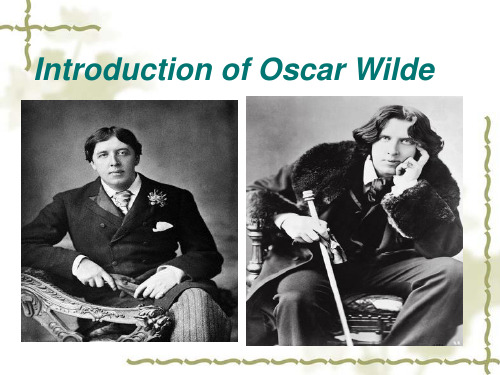
1970
2009
2005
童话集
* 《快乐王子和其他故事》(The Happy Prince and Other Tales, 快乐王子和其他故事》 , 1888年) 年 收录童话: 收录童话: 快乐王子( 《快乐王子(The happy prince)》 ) 夜莺与蔷薇( 《夜莺与蔷薇(The nightingale and the rose)》 ) 自私的巨人( 《自私的巨人(The selfish Giant)》 ) 忠实的朋友( 《忠实的朋友(The devoted friend)》 ) 了不起的火箭( 《了不起的火箭(The remarkable rocket)》 ) * 《石榴屋》(A House of Pomegranates,1891年) 石榴屋》 , 年 收录童话: 收录童话: 少年国王( 《少年国王(The young king)》 ) 西班牙公主的生日( 《西班牙公主的生日(The birthday of the infanta)》 ) 渔人和他的灵魂( 《渔人和他的灵魂(The fisherman and his soul)》 ) 星孩( 《星孩(The star-child)》 )
Bosie
20世纪末,在遭到毁誉近一个世纪以后,英国终于 给了王尔德树立雕像的荣誉。1998年11月30日, 由麦姬·汉姆林雕塑的王尔德雕像在伦敦特拉法尔加 广场附近的阿德莱德街揭幕。雕像的标题为“与奥 斯卡·王尔德的对话”,同时刻有王尔德常被引用的 语录:“我们都在阴沟里,但仍有人仰望 “我们都在阴沟里, 空。”(We are all in the gutter, but some of us are looking at the stars.) 王尔德的审判是英国司法史上最引人注目的案件之 一,也是同性恋平权运动史上被引用最多的案件之 一。在同性恋不再被视为异端、被普遍接受的20世 纪末、21世纪初,他成了同性恋社群的一个文化偶 像。
奥斯卡·王尔德
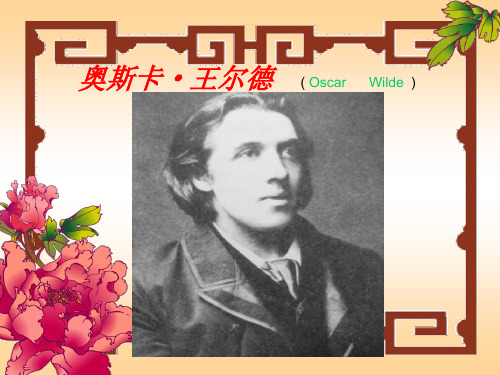
( Oscar
Wilde )
一位才气逼人的才子
奥斯卡.王尔德(Oscar Wilde,18561900),英国著名诗人、作家及戏剧家,英国 文学史上唯美主义运动的创始人和首领之一, 主张“为艺术而艺术”,反对文学带有功利主 义色彩,认为文学不应受任何道德标准的支配。 他也是英国颓废派文学的代表。
王尔德生于爱尔兰都柏林的一个家世卓越 的家庭,是家中的次子,全名为:奥斯卡·芬 葛·欧佛雷泰·威尔斯·怀尔德(Oscar Fingal O'Flahertie Wills Wilde)。他的父亲威廉姆·怀 尔德爵士是一个外科医生,他的母亲是一位诗 人与作家
奥斯卡.王尔德的一生 奥斯卡 王尔德的一生
王尔德主要代表作品
<1>文作 : 道林·格雷的画像(The Picture of Dorian Gray,1891年) 《社会主义下人的灵魂》(The Soul of Man Under Socialism, 1891年) 王尔德童话集 《深渊书简》(1905年,作者死后出版) <2>诗作 : 《诗集》(1811年) 《瑞丁监狱之歌》(The Ballad of Reading Gaol)
王尔德与中国文学
<1>最早汉译王尔德的是周作人。他将王尔德译为淮尔德。 在周氏兄弟1909年编译的《域外小说集》中,开篇即是《安 乐王子》(即《快乐王子》)。 <2>王尔德与中国新文学结缘甚早。在鲁迅眼里,他属于 异域“世纪末的果汁”中的一份。1924年洪深改编的 《少奶奶的扇子》在上海演出,一时好评如潮。 <3> 建筑师王大闳先生将《道林·格雷的画像》译写为 《杜连魁》,场景亦转换为当时的台北。
•
Oscar Wilde(奥斯卡 王尔德)
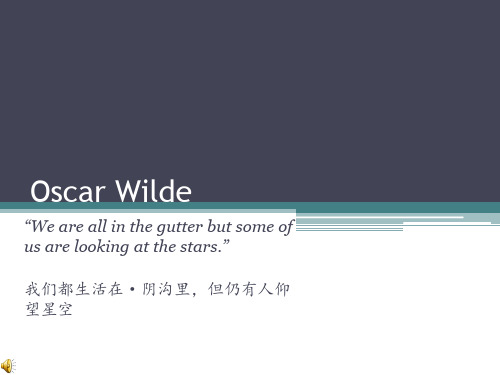
• Wilde full confidence and extraordinary talent, though his old age is very down and out, but his artistic achievements still makes him the world's classic artists. His fairy tale also won the readers the favor Wilde and therefore known as the “fairy tale prince.”
Oscar Wilde's sayings
王尔德语录
love
• The only difference between a caprice(随意) and a life-long passion is that the caprice lasts a little longer. • 逢场作戏和终身不渝之间的区别只在于逢场作戏稍微长一些。 • When one is in love, one always begins by ving one’s self, and one always ends by deceiving others. • 恋爱总是以自欺开始,以欺人结束。 • The very essence of romance is uncertainty. • 浪漫的精髓就在于它充满种种可能。
• Wilde lived through legend(传奇), because the gay lover Alfred Douglas (Lord Alfred Douglas) for up to four years in prison contacts were reported. Left England to settle in France after his release until November 30, 1900 due to meningitis(脑膜炎) in Paris hotel Alsace (Alsace) died.
奥斯卡王尔德维多利亚时代最杰出的戏剧家与作家

奥斯卡王尔德维多利亚时代最杰出的戏剧家与作家奥斯卡·王尔德(Oscar Wilde)是19世纪末英国最杰出的戏剧家与作家之一,他的作品对当时英国文学和戏剧的发展产生了深远的影响。
他以独特的幽默风格、富有戏剧性的情节和深刻的社会批判而闻名于世。
本文将介绍奥斯卡·王尔德的生平事迹以及他最著名的作品,揭示他为何被认为是维多利亚时代最杰出的戏剧家与作家。
第一部分:生平事迹奥斯卡·王尔德于1854年出生在爱尔兰的都柏林。
他在都柏林的皇家学校接受了良好的教育,展现出非凡的才华和智慧。
在大学期间,他成为了一位杰出的演讲家和作家,以其机智、机敏和洒脱而深受欢迎。
毕业后,王尔德前往伦敦追求文学与戏剧事业。
他的第一部剧作《莎乐美人》于1892年首演,并获得了巨大的成功。
之后他又相继创作了一系列的剧作,如《风流绅士的才艺》、《无足轻重的女人》等,在英国戏剧界崭露头角。
然而,王尔德的天才并非仅限于戏剧领域,在小说和散文方面,他也取得了非凡的成就。
第二部分:作品分析1. 戏剧作品王尔德的戏剧作品以幽默、讽刺和社会批判著称。
他以巧妙的对话和反转的情节展示了维多利亚时代社会的虚伪与荒谬。
其中最著名的剧作之一是《厄尔尼诺夫人的扇子》,讲述了一个父亲试图揭露他女儿和他的好友之间不道德关系的故事。
这部剧作以王尔德独特的幽默和尖锐的社会评论,让观众对当时的道德标准进行了深思。
2. 小说作品王尔德最著名的小说是《道林·格雷的画像》,这是一部探讨美与堕落的哲学小说。
故事主要讲述了一位年轻人道林·格雷与一位神秘画家之间的交易,导致了他的画像承受了所有恶行的后果。
通过这个故事,王尔德对人性、道德和美的关系进行了深入的思考和探索。
第三部分:影响与遗产奥斯卡·王尔德的作品和思想对当时的文学和戏剧界产生了深远的影响,并且在今天仍然具有重要的意义。
他通过幽默和讽刺揭示了维多利亚时代社会的虚伪,对那个时代的道德标准进行了有力的冲击。
王尔德英国文学巨匠的浪漫之旅

王尔德英国文学巨匠的浪漫之旅王尔德(Oscar Wilde)是19世纪末期英国文学史上的杰出人物,他以其独特的文风和智慧的幽默感而闻名于世。
作为一位浪漫主义的代表,他的作品充满着对爱情、美感和人性的追求。
本文将带您一起走进王尔德的文学世界,探索他的浪漫之旅。
一、王尔德的文学才华王尔德出生在爱尔兰一个有艺术氛围的家庭,从小就接触到了各种文学作品,培养了他的文学素养和独到的见解。
他在牛津大学学习古典文学,对希腊神话和罗马诗歌有着深入的研究。
这些文学背景为他今后的创作打下了坚实的基础。
二、浪漫主义的旗手王尔德是浪漫主义文学的代表,他的作品常常充满着浓厚的浪漫主义色彩。
他的小说《道林·格雷的画像》讲述了一个以美貌为代价的永生的故事,揭示了人类欲望和自我放纵的代价。
这部小说以其深度的思考和细腻的描写感动了全球读者。
三、戏剧的艺术语言除了小说,王尔德还以他的戏剧作品闻名。
他的戏剧作品中最著名的是《伊丽莎白时代的吕舍尔夫人》,该剧以幽默和讽刺的手法描述了虚伪和道德约束的社会。
通过精妙的对白和独特的剧情安排,他成功地捕捉到了人性中的矛盾与悲剧。
四、对美的追求王尔德对美的独特见解体现在他的散文和诗歌中。
他的散文《批判的散文》中,王尔德写道:“生活本身就是艺术,艺术就是生活。
”他认为,生活中的点滴细节和美好瞬间都是艺术的一部分。
他的诗歌作品《春天的诗歌》以其清新的风格和细腻的描写,展现了对自然和美的渴望。
五、社会批判与自由思想王尔德的作品中也包含了对社会现象的深刻批判和对传统道德观念的质疑。
他的剧作《安布罗斯·潘德》揭示了社会阶级的不公和剥削。
他以机智幽默的对话和尖锐的讽刺展现了对当时社会现象的看法。
六、王尔德的人生离奇不幸的是,王尔德的浪漫之旅并不总是光鲜。
他因为同性恋身份而遭受社会的排斥和法律的打击,最终在监狱中度过了最后几年的生活。
然而,这并没有削弱他作为一位文学巨匠的地位。
他的作品继续在世界范围内被推崇和传颂。
Oscar Wilde

Comedies of society
Main articles: Lady Windermere's Fan, ( first performed on 20 February 1892 at St James Theatre, packed with the cream of society) A Woman of No Importance, An Ideal Husband
奥斯卡•王尔德,十九世纪与萧伯纳齐名的 大才子,剧作家、评论家、诗人、散文家, 出生于爱尔兰,是英国唯美主义文学的代表 人物,“为艺术而艺术”的倡导者之一。
Apprenticeship of an aesthete: 1880s Debut in society
代表作品: 1.小说《道林· 格雷的画像》(The Picture of Dorian Gray,1891年) 2.骇世之作《狱中记》De Profundis 最为著名。
Oscar Wilde(1854—1900)
奥斯卡· 王尔德
Wilde.Oscar, the celebrated Irish born wit , novelist , playwright , poet , and critic , was the chief proponent of the aesthetic movement, based on the principle of "Art for Art 's Sake".
De Profundis (letter) 狱中记
O.Wilde在狱中给自己的同性恋密友道格拉斯(Lord Alfred Douglas) 即Bosie的长信。
First part: Wilde's account of time with Douglas; Second part: Christ as a romantic artist
奥斯卡·王尔德的幽默与讽刺风格分析

奥斯卡·王尔德的幽默与讽刺风格分析引言奥斯卡·王尔德(Oscar Wilde)是19世纪末英国文坛上最具影响力的戏剧家和作家之一。
他以其独特的幽默和讽刺风格而闻名,他的作品通常充满了智慧、嘲讽和社会批评。
本文将对奥斯卡·王尔德的幽默和讽刺风格进行深入分析。
幽默风格分析奥斯卡·王尔德是一位高度机智、善于用各种调侃和俏皮话来展现他伶俐才思的作家。
他经常使用双关语、讽刺和对话来制造笑料和引起读者的思考。
以下是几个常见的幽默手法:1.双关语:王尔德经常使用双关语来制造幽默效果。
例如,在他的剧作《厄尼斯特与塞西尔》中,主角阿尔吉农在解释自己的怪异行为时说,“我从不相信如果一个男人突然改变自己穿着而失去记忆,那样的人仍然能算作是一个绅士。
”这里的双关语“绅士”既指绅士风度也可以理解为绅士套装,从而制造了笑料。
2.对话技巧:王尔德擅长通过对话来展现人物之间的幽默和讽刺。
他经常使用机智的回应、褒扬、暗示和互相挖苦以达到幽默效果。
在《道林·格雷的画像》中,王尔德通过主角哈利与亨利爵爷之间关于美丽与道德的对话,揭示了社会对外表美的偏见和虚伪。
3.调侃社会:王尔德善于以幽默和讽刺的方式批评当时社会中的不合理现象和伪善行为。
他用寓言或者夸张手法揭示出人们对权力、财富和地位的追逐所产生的可笑场景。
例如,在他最著名的剧作《温德米尔夫人》中,通过主角弗格杰拉德夫妇及其朋友圈子之间滑稽而虚伪的交往展示了上流社会过度注重表面光鲜而忽略内涵的一面。
讽刺风格分析除了幽默手法,王尔德的作品还充满了讽刺。
通过对社会现象和人性的剖析,他以尖锐和嘲讽的语言揭示出社会中隐藏的荒谬和虚伪。
以下是他常用的讽刺手法:1.夸张:王尔德常使用夸张来强调某种特点或行为,并通过夸张来暴露其荒诞不经。
例如,在《温德米尔夫人》中,为了迎合上流社会对外表美的追求,主角达西警告女儿们要保持青春不变,结果她们用各种方法维持外貌年轻却内心空虚,这种夸张暗示了对美丑观念过度追求所带来的可笑后果。
英国文学 Oscar Wilde ppt课件
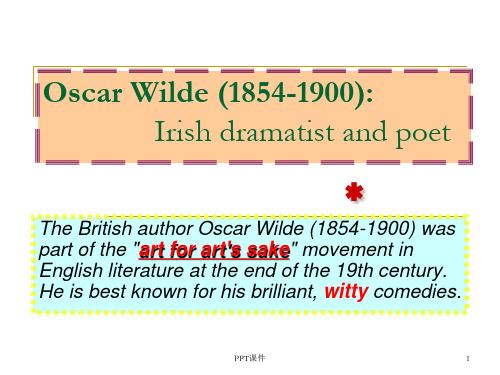
the school of “ Art for Art’s Sake”. 1895 he was arrested and sentenced to jail for
homosexuality. After 2 years of imprisonment, he emigrated to France and
PPT课件
1
Literature of 90’s
• In the late Victorian Age , there was an overall change of attitude in literature. The writers of the 1890’s are sometimes styled "Late Victorians" and sometimes "the first of the moderns".
PPT课件
5
Oscar Wilde : Life / writing
(17 years of success in Britain and in America ) A Critic of literature and of society:
The Decay of Lying (1889) The Soul of Man Under Socialism (1891)
A Novelist: The Portrait of Dorian Gray (1891)
PPT课件
6
Oscar Wilde : Life / writing
﹡As one of the greatest Playwrights of the Victorian Era: Lady Windermere’s Fan (1892) A Woman of No Importance (1893) Salome (1893) An Ideal Husband (1895) The Importance of Being Earnest (1895)
王尔德的名词解释

王尔德的名词解释王尔德(Oscar Wilde)是19世纪末英国文学史上一位备受赞誉的作家和戏剧家。
他以他独特的幽默和挖掘社会伪善的才能而闻名,创作了一系列经典作品。
本文将通过对王尔德的名词解释,探讨他的作品和思想对当代文学和社会的影响。
首先,我们来解释一下王尔德的“幽默”。
与传统的笑话相比,王尔德的幽默更多地呈现出一种机智和智慧。
他通过对社会现象、人性弱点和嘲讽伪装的剖析,引发读者对社会道德和约束的思考。
在他的戏剧作品《温德尔的意志》中,他以幽默的方式揭示了社会的虚伪和形象的重要性。
这种幽默有时是轻松愉快的,让人发笑,但它也经常带有讽刺和嘲笑,强调现实与理想之间的冲突。
王尔德的另一个重要概念是“道德”。
他经常在作品中解构和质疑当时社会对道德的定义和标准。
他认为文明社会的道德观念常常被伪善的表面所掩盖。
在他的小说《道林·格雷的画像》中,他通过描绘主人公通过道德堕落来保持年轻的形象,挑战了传统的道德观念。
他认为,道德的本质不应仅仅取决于外在行为的表现,而是应该包括内心的独立思考和真实自我。
王尔德对社会伪善的批判也是他作品的一个重要主题。
他揭示了社会上众多虚假现象,如虚伪的社交礼节、扭曲的面具和人们为了维护社会形象而违背内心的行为。
他的剧作《重返狄龙小屋》中,他通过展示角色们伪装自己的表面和真实的本质之间的冲突,批判了维持社会体面的虚假行为。
除了对社会伪善的揭露,王尔德的作品还关注个体的自由和真实的追求。
他强调每个人都有权利追求自己的欲望和梦想,而不必受到社会和道德的束缚。
在他的戏剧作品《夏洛克·霍姆斯故事》中,他通过描绘一个个体追求自由和满足个人欲望的故事,表达了对个体独立性的支持。
尽管王尔德的作品在当时社会引起了争议,他的思想和创作对当代文学和社会产生了深远的影响。
他的批判精神激发了后来一代作家和评论家对社会现象和道德观念的重新审视。
他的演讲和散文作品也激发了对自由思想和言论自由的关注。
英语文学-Oscar-Wilde-奥斯卡-王尔德介绍

The pictures of the three main Characters
Dorian Gray 道林 格雷
Basil Hallward 巴兹尔 霍尔华德
Lord Henry 亨利
Main Plot 主要情节
The novel tells of a young man named Dorian Gray, the subject of a painting by artist Basil Hallward. Basil is impressed by Dorian's beauty and becomes infatuated with him, believing his beauty is responsible for a new mode in his art. Dorian meets Lord Henry Wotton, a friend of Basil's, and becomes enthralled by Lord Henry's world view.
Main works 主要作品
• Novels 小说
The Picture of Dorian Gray(道林·格雷的画像)
• Fairy tales 童话
The happy prince(快乐王子) The nightingale and the rose(夜莺与蔷薇) The selfish Giant(自私的巨人) The fisherman and his soul(渔人和他的灵魂) The star-child(星孩)
• His imprisonment indicates the end of the Aesthetic
奥斯卡王尔德(Oscar Wilde)

12、The only thing worse than being talked about is not being talked about. 世上只有一件事比被人议论更糟糕,那就是没有人议论 你。 13、All charming people, I fancy, are spoiled. It is the secret of their attraction 我想所有迷人的人都是被宠爱着的,这是他们吸引力来 源的秘密。 14、To do nothing at all is the most difficult thing in the world, the most difficult and the most intellectual 什么也不做是世上最难的事情,最困难并且最智慧。 15、A true friend stabs you in the front. 真朋友才会当面中伤你。 16、Always forgive your enemies - nothing annoys them so much. 永远宽恕你的敌人,没有什么能比这个更让他们恼怒的了。 17、There are only two tragedies in life: one is not getting what one wants, and the other is getting it. 生活中只有两种悲剧:一个是没有得到我们想要的,另外一个是得到我 们想要的。
虽然年轻的王尔德还没有获得一个文学奖项,但服装惹 眼、谈吐机智、特立独行的他在伦敦社交界已经小有名 气,一些杂志甚至刊登着讽刺他的文章。
1877年,王尔德与另外两位年轻人陪马哈菲教授一同到 希腊旅游,为希腊的自然景致和精美建筑倾倒,以致于 流连忘返,延误了上课。回到牛津后他被校方罚款45英 镑,次年罚款因他学业的优异而返还。
奥斯卡王尔德 19世纪英国作家的才华与悲剧

奥斯卡王尔德 19世纪英国作家的才华与悲剧奥斯卡·王尔德(Oscar Wilde)是19世纪英国著名的作家、剧作家、评论家和演讲家。
他以他的才华和幽默著称,但也承受了巨大的悲剧。
这篇文章将介绍奥斯卡·王尔德的文学才华以及他生命中的悲剧。
奥斯卡·王尔德出生于1854年,他在爱尔兰度过了他的童年和少年时光。
他在都柏林的一所贵族学校接受了良好的教育,并且在三一学院读书期间表现出非凡的才华。
他在剑桥大学学习期间写了一些杰出的诗歌,这些作品引起了文学界的注意。
1880年代初,奥斯卡·王尔德搬到了伦敦,并开始涉足戏剧界。
他的剧作展示了他的才华和幽默,其中最著名的作品包括《道林·格雷的画像》和《温夫人的扇子》。
这些作品展示了王尔德的锐利洞察力和对社会的嘲讽,使他成为了当时最受欢迎的剧作家之一。
然而,正当奥斯卡·王尔德的事业达到巅峰时,他的生活却陷入了悲剧。
1895年,他与男爵阿尔弗雷德·道格拉斯(Alfred Douglas)之间的同性恋关系曝光,这在当时被视为严重的罪行。
王尔德被判入狱两年,他的名声遭受了严重的损害,而他的身体也在狱中受到摧残。
出狱后,奥斯卡·王尔德变得疲惫和失望。
他离开了英国前往法国,希望能够重新开始。
然而,他的健康状况逐渐恶化,并于1900年在贫困中去世。
尽管他的生活走向了悲剧的结局,但奥斯卡·王尔德的才华和影响力仍然在文学界存留至今。
王尔德的作品继续在读者和观众中产生影响。
他的幽默和机智语言的运用使他的作品独特而独立。
他对道德和社会观念的挑战,以及对人性和爱情的深入洞察,使他的作品超越了时代的限制。
尽管他的生活充满了悲剧,奥斯卡·王尔德的才华使他成为19世纪英国文学的瑰宝。
他的作品和影响力在他的时代和今天仍然是不可磨灭的。
他的故事也提醒着我们要珍惜才华,尊重和理解不同的观念,以及对待他人和自己的选择保持宽容和尊重。
奥斯卡王尔德世纪末英国最具才华的作家
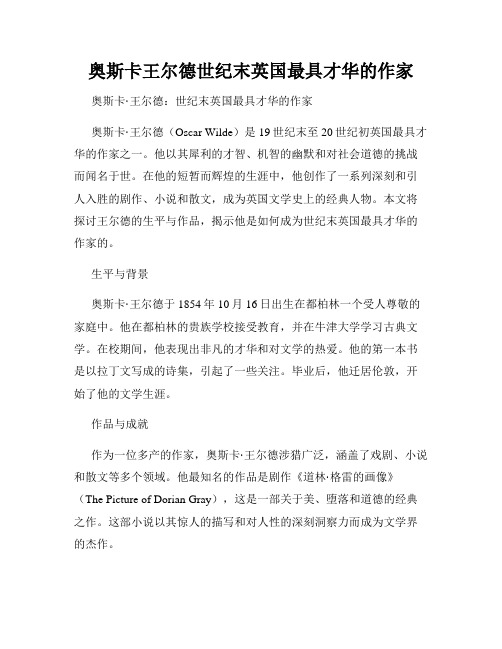
奥斯卡王尔德世纪末英国最具才华的作家奥斯卡·王尔德:世纪末英国最具才华的作家奥斯卡·王尔德(Oscar Wilde)是19世纪末至20世纪初英国最具才华的作家之一。
他以其犀利的才智、机智的幽默和对社会道德的挑战而闻名于世。
在他的短暂而辉煌的生涯中,他创作了一系列深刻和引人入胜的剧作、小说和散文,成为英国文学史上的经典人物。
本文将探讨王尔德的生平与作品,揭示他是如何成为世纪末英国最具才华的作家的。
生平与背景奥斯卡·王尔德于1854年10月16日出生在都柏林一个受人尊敬的家庭中。
他在都柏林的贵族学校接受教育,并在牛津大学学习古典文学。
在校期间,他表现出非凡的才华和对文学的热爱。
他的第一本书是以拉丁文写成的诗集,引起了一些关注。
毕业后,他迁居伦敦,开始了他的文学生涯。
作品与成就作为一位多产的作家,奥斯卡·王尔德涉猎广泛,涵盖了戏剧、小说和散文等多个领域。
他最知名的作品是剧作《道林·格雷的画像》(The Picture of Dorian Gray),这是一部关于美、堕落和道德的经典之作。
这部小说以其惊人的描写和对人性的深刻洞察力而成为文学界的杰作。
除了《道林·格雷的画像》,奥斯卡·王尔德还写了其他一些备受赞誉的剧本,如《重要的人物》(The Importance of Being Earnest)和《万王之王》(The King of the Golden River)。
这些作品展示了他出色的幽默感和对社会伪善的批判。
与作品一样,奥斯卡·王尔德本人也是个极具魅力的人物。
他以他的风格和外表成为了当时社交场合的焦点。
他善于与人交往,并能够在他的言辞中融入机智的幽默。
然而,他的生活并不尽如人意。
1895年,他因为与男性有染的指控而被判入狱两年。
这件事对他的创作和声誉造成了巨大的打击。
遗产与影响奥斯卡·王尔德的才华和影响力不仅体现在他的作品中,也体现在他对文化和社会观念的塑造上。
王尔德的简介10字
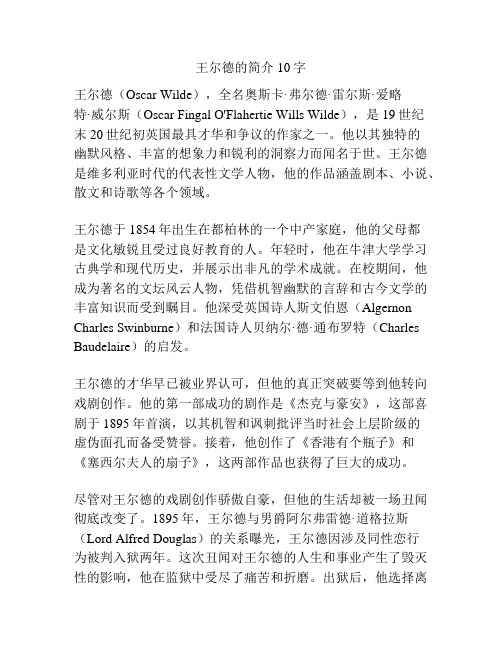
王尔德的简介10字王尔德(Oscar Wilde),全名奥斯卡·弗尔德·雷尔斯·爱略特·威尔斯(Oscar Fingal O'Flahertie Wills Wilde),是19世纪末20世纪初英国最具才华和争议的作家之一。
他以其独特的幽默风格、丰富的想象力和锐利的洞察力而闻名于世。
王尔德是维多利亚时代的代表性文学人物,他的作品涵盖剧本、小说、散文和诗歌等各个领域。
王尔德于1854年出生在都柏林的一个中产家庭,他的父母都是文化敏锐且受过良好教育的人。
年轻时,他在牛津大学学习古典学和现代历史,并展示出非凡的学术成就。
在校期间,他成为著名的文坛风云人物,凭借机智幽默的言辞和古今文学的丰富知识而受到瞩目。
他深受英国诗人斯文伯恩(Algernon Charles Swinburne)和法国诗人贝纳尔·德·通布罗特(Charles Baudelaire)的启发。
王尔德的才华早已被业界认可,但他的真正突破要等到他转向戏剧创作。
他的第一部成功的剧作是《杰克与豪安》,这部喜剧于1895年首演,以其机智和讽刺批评当时社会上层阶级的虚伪面孔而备受赞誉。
接着,他创作了《香港有个瓶子》和《塞西尔夫人的扇子》,这两部作品也获得了巨大的成功。
尽管对王尔德的戏剧创作骄傲自豪,但他的生活却被一场丑闻彻底改变了。
1895年,王尔德与男爵阿尔弗雷德·道格拉斯(Lord Alfred Douglas)的关系曝光,王尔德因涉及同性恋行为被判入狱两年。
这次丑闻对王尔德的人生和事业产生了毁灭性的影响,他在监狱中受尽了痛苦和折磨。
出狱后,他选择离开英国,前往法国的巴黎,度过了剩下的几年生涯。
尽管生活经历了巨大的挫折,但王尔德对文学的热爱和创作的激情从未消减。
他在巴黎的最后几年里,创作了他最伟大和最后的作品之一《斯坦达尔》。
这部悲剧揭示了他内心深处的痛苦和对人性的深刻思考。
英国文学选读Oscar Wilde奥斯卡 王尔德

Oscar Wilde
(1854-1900)
About Oscar Wilde
• Name: Oscar Wilde (奥斯卡 王尔德) • Nationality: English • Date of Birth: 16 October 1854, Dublin, Ireland • Date of Death: 30 November 1900, Paris, France • Profession: A gifted poet, playwright, and wit
Poems: 《诗集》(Poems,1881年) 《斯芬克斯》(Sphinx,1894年) 《里丁狱之歌》(The Ballad of Reading Gaol,1898 年) Drama: 《温德米尔夫人的扇子》(Lady Windermere`s Fan,1892 年。 《帕都瓦公爵夫人》(The Duchess of Padua,1893年) 《莎乐美》(Salomé,1893年)(原著用法语写成) 《认真的重要性》(The Importance of Being Earnest, 1895年) 《理想的丈夫》(An Ideal Husband,1895年。) 《一个无足轻重的女人》(A Woman of No Importance, 1893) Essays The Soul of Man Under Socialism《社会主义下人的灵魂》 Letters De Profundis《深渊书简 》
《夜莺与蔷薇》(The nightingale and the rose) 《自私的巨人》(The selfish Giant) 《忠实的朋友》(the devoted friend) 《了不起的火箭》(the remarkable rocket ) 《石榴屋》(A House of Pomegranates,1891年)
- 1、下载文档前请自行甄别文档内容的完整性,平台不提供额外的编辑、内容补充、找答案等附加服务。
- 2、"仅部分预览"的文档,不可在线预览部分如存在完整性等问题,可反馈申请退款(可完整预览的文档不适用该条件!)。
- 3、如文档侵犯您的权益,请联系客服反馈,我们会尽快为您处理(人工客服工作时间:9:00-18:30)。
Oscar Wilde : Life / writing
(17 years of success in Britain and in America ) A Critic of literature and of society: The Decay of Lying (1889) The Soul of Man Under Socialism (1891) A Novelist: The Portrait of Dorian Gray (1891)
Oscar Wilde : point of view
3. He believed that art had nothing to do with morality, but should exist for its own sake. Artists, Wilde believed, should be left to pursue their art, without the involvement of the state. Private property should be abolished, since ownership hindered the development and spirit of art. Wilde’s took him towards propagandizing for “art for art’s sake”.
Oscar Wilde : point of view
﹡
1. He dared to challenge the English social ideals. In his deeply humane and subversive essay, The Soul of Man Under Socialism, Wilde, in fact, heaped scorn on piecemeal approaches to the social ills produced by capitalism. Of the reforms he said, “their remedies do not cure the disease: they merely prolong it. The proper aim is to try and reconstruct society on such a basis that poverty will be impossible.”
Oscar Wilde : Life / writing
Born and grew up in Dublin Educated in Dublin’s Trinity College and Oxford. After his graduation in 1878, he settled in London where he established himself both as a writer and as a spokesman for the school of “ Art for Art’s Sake”. 1895 he was arrested and sentenced to jail for homosexuality. After 2 years of imprisonment, he emigrated to France and led a gloomy life there. Died in 1900 and buried in Paris.
﹡
Literature of 90’s
• In the late Victorian Age , there was an overall change of attitude in literature. The writers of the 1890’s are sometimes styled "Late Victorians" and sometimes "the first of the moderns". • The most important literary movement in this final decade, is the Aestheticism, represented by Oscar Wilde
The Aesthetic Movement: Aestheticism
Aestheticism places art above life, and holds that life should imitate art, not art imitate life. This was a reaction against the Victorian convention of art for morality’s sake, or art for money’s sake. The main characteristics of the movement were: suggestion rather than statement, sensuality, massive use of symbols, synaesthetic effects, that is correspondence between words, colours and music.
Oscar Wilde : Life / writing
﹡
As one of the greatest Playwrights of the Victorian Era: Lady Windermere’s Fan (1892) A Woman of No Importance (1893) Salome (1893) An Ideal Husband (1895) The Importance of Being Earnest (1895)
﹡
The Aesthetic Movement:
It is a loosely defined movement in art and in literature in later 19th century Britain. the Aestheticism had its forerunners in John Keats and Percy Bysshe Shelley. Aesthetic writers used the slogan, “art for art’s sake” and asserted that there was no connection between art and morality. They believed that Art does not have any didactic purpose, it need only be beautiful. Arts should provide refined sensuous pleasure, rather than convey moral or sentimental message. Only when art is for art's sake, can it be immortal.
Oscar Wilde (1854-1900): Irish dramatist and poet
The British author Oscar Wilde (1854-1900) was part of the "art for art's sake" movement in English literature at the end of the 19th century. He is best known for his brilliant, witty comedies.
His writing features:
﹡
He demonstrated a breaking away from the conventional well-made plays of the 1870s and 1880s. he expressed a satirical and bitter attitude towards the upper-class people by revealing their corruption, their snobbery, and their hypocrisy in his plays. In brilliance of verbal wit, wilde is close akin to George Bernard Shaw.
Oscar Wilde : point of view
﹡
4. “Art for art’s sake” is the best-known aspect of Wilde’s life and writings. He argued that human beings should cultivate their aesthetic sensibilities, their appreciation of beautiful artistry. Life, he was saying, should consist of more than adherence to dull and restrictive notions of what was useful or moral. It should aspire to the freedom of art and the variety of experience it of Being Earnest
Relationship
Lady Bracknell
Cecily
Guardian
mother
Gwendolen
LOVE
cousin
Jack/Ernest
brother
Algernon/Ernest
